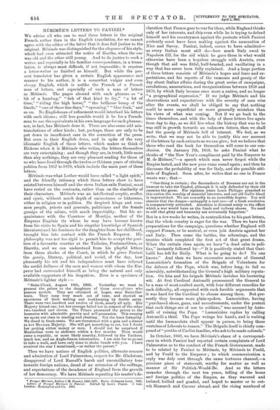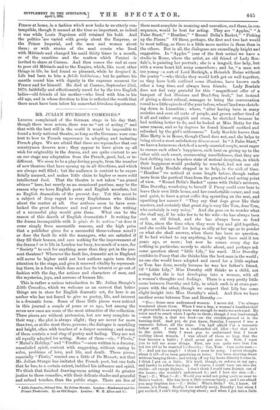MERTMPE'S LETTERS TO PANIZZI.* WE advise all who can to
read these letters in the original French, rather than in the English translation, for we cannot agree with the editor of the latter that it does full justice to the original. Merinade was distinguished for the elegance of his style, which had even attracted the notice of Goethe, when the one was old and the other still young. And to do justice to such a writer, and especially in his familiar correspondence, in a trans- lation, is always most difficult, if not impossible ; it requires a letter-writer as finished as himself. But while the pre- sent translator has given a certain English appearance and manner to his author, it is a somewhat vulgar and even slangy English, which is unlike the French of a French man of letters, and especially of such a man of letters as Merimee. The pages abound with such phrases as "a bit of a humbug," "fish of that kind to fry," "a lot of time," "riding the high horse," " the bellicose bump of the Gauls," "one of these fine days," "spooning," "blue funk," and so on. No Englishman of refinement would interlard his letters with such idioms ; still less possible would it be for a French- man to use the equivalents in his own language for such phrases; nor, in fact, has Merimee done it. There are also some odd mis- translations of other kinds ; but, perhaps, these are only to be put down to insufficient care in the correction of the press. But even in their English dress, and in spite of the very idiomatic English of these letters, which makes us think of Dickens when it is 116rime'e who writes, the letters themselves are very entertaining : and though they are, in truth, little more than airy nothings, they are very pleasant reading for those of us who have lived through the twelve or thirteen years of stirring politics from 1857 to 1870, which include the main part of these letters.
Ild6rim6e was what Luther would have called "a light spirit," and the friendly intimacy which these letters show to have existed between himself and the stern Italian exile Panizzi, must have rested on the contrasts, rather than on the similarity of their characters. Merim4e was an intellectual sceptic, scoffer, and cynic, without much depth of earnestness or bitterness, either in religion or in politics. He despised kings and com- mon people, priests and generals, politicians and the female gossips of the salons, with much impartiality. But his ac- quaintance with the Countess of Montijo, mother of the Empress Euenie (to whom he may have become known from his visits to Spain and his singular knowledge of Spanish literature) and his fondness for the daughter from her childhood, brought him into contact with the French Emperor. His philosophy was not too rigid to permit him to accept the posi- tion of a favourite courtier at the Tuileries, Fontainebleau, or Biarritz, and we can understand from his playful letters from these abodes of the Court, in which he gives Panizzi the gossip, literary, political, and social, of the day, how pleasantly his wit and his independence must have relieved the sordid dullness of the men and women with whom the Em- peror had surrounded himself, as being the natural and only available supporters of his despotism. Here is a specimen of Meiimee's lighter style :—
" Saint-Cloud, August 19th, 1866. Yesterday we went to present the prizes to the daughters of those sous-officiers who possess medals. They are educated at Loges, near Saint-Ger- main. They sang very much out of tune, and showed us specimens of their writing and bookkeeping by double entry. There were two hundred and twelve of them, nearly all ugly. Her Majesty kissed one, but her courage failed her in respect of the other two hundred and eleven. The Prince presented the prizes to the laureates with admirable gravity and self-possession. This evening we spent our time in reading and chatting. Not the least formality. We dined in frock-coats. We are threatened with a gala and a dinner to her Mexican Majesty. She will get something to eat, but I doubt her getting either money or men. I should not be surprised if Maximilian were to abdicate within a few months. Then would come a republic, or more likely anarchy, followed by the Yankees, lynch law, and an Anglo-Saxon colonisation. I am sent for to go out to take a walk, and have only time to shake hands with you. I have received the star I mentioned,—or rather the patent."
Then we have notices of English politics, alternate censure and admiration of Lord Palmerston, respect for Mr. Gladstone, disapproval of Lord Russell's harsh and unconciliatory tone towards foreign nations, dread of an extension of the suffrage,
and expectations of the decadence of England from the growth of her democracy. We have Merim6e repeating his master's de- • Prosper Idlrinsee, Dares d M. Panissi, 1850-1870. Paris: Caalmann Levy. 1881. Letters of Prosper Merinute to Panizzi. Edited by Lou:s Fagan. 2 vols. London : Remington and Co. 1891.
claration that France goes to war for ideas, while England. thinks only of her interests, and this even while he is trying to defend himself and his countrymen against the protests which Panizzi evidently must have been making against the annexation of Nice and Savoy. Panizzi, indeed, seems to have admitted— as every Italian must still do—how much Italy owed to Napoleon III. for the aid which he gave them in what would otherwise have been a hopeless struggle with Austria, even though that aid was fitful, half-hearted, and vacillating in a way that has never been fully explained. And a large portion of these letters consists of Me'ritnee's hopes and fears and ex- pectations, and. his reports of the rumours and gossip of the day about Italian affairs during the great series of campaigns, revolutions, annexations, and reorganisations between 1859 and 1870, by which Italy became once more a nation, and no longer "a geographical expression." If we judge Merlin& and his observations and expectations with the severity of men wise after the events, we shall be obliged to say that nothing could be more superficial or more generally mistaken than his views of what was coming. But if we go back to the times themselves, and with the help of these letters live again from day to day, as we did. live when the history that was to be was still in growth towards an unknown future, then we shall find the gossip of Merimde full of interest. We feel, as we write, that we may not be able to justify this our account of the letters by such extracts as we can give; but we believe that those who read. the book for themselves will come to our con- clusion. On January 7th, 1859, he asks Panizzi what he thinks of "the New Year's compliment paid by the Emperor to M. de Hiibner,"—a speech which men never forgot while the Empire lasted, and the new year came round again ; and then he discusses the probability of war for Italy, and the possible atti- tude of England. Soon after, he writes that no one in France wants war ; that-
" One thing is certain ; the descendants of Brennns are not in the humour to take the Capitol, although it is only defended by their old enemies the geese. For eighteen years Louis Philippe preached to this nation the worship of material interests, and our old Gallic blood is impoverished. We are cowardly to an incredible degree. Yon will observe that the danger—unhappily a real one—of a fresh revolution is comparatively unheeded. Attention is directed solely to the effect which a war would have on the funds and railway shares. No need to add that glory and humanity are universally forgotten."
But in a few weeks he writes, in contradiction to his past letters, that the whole country is eager for the war. Then we have the preparations for the campaign, questions whether England. will support France, or be neutral, or even join Austria against her and Italy. Then come the battles, the schemings, and the treaties which completed the first act of that great drama. When the curtain rises again, we have "a dead. calm in poli- tics," instantly followed by—" It is positively stated that Gari- baldi has left for Sicily. What is he going to do ? No one knows." And then we have successive accounts of General Lamoriciere's formation of the Brigade of Volunteers for the defence of the Pope, which was, before long, to fail so miserably, notwithstanding the General's high military reputa- tion. On him and his brigade Mediae lavishes his bantering wit. At first Cardinal Antonelli pronounced the General to be a man of most exalted merit, with four different remedies for each difficulty, all supported with such forcible arguments that it was hard for the Cardinal to choose among them. But pre- sently they became more plain-spoken. La.moriciere, having "purchased shoes, guns, and accoutrements, under the pretext that such things are of use to soldiers," was accused by Anto- nelli of raining the Pope. " Lamoriciere replies by calling Antonelli a thief. The Pope wrings his hands, and is waiting until the Immacolata shall appear in person, to bring these wretches of Liberals to reason." The Brigade itself is chiefly com- posed of "youths of Carlist families, who ask to be made colonels."
In October, 1860, we have Merim4e's share of a correspond- ence in which Panizzi had reported certain complaints of Lord Palmerston as to the conduct of the French Government, made to be related by Panizzi to llif6rim6e, by Merimee to Fould, and by Fould to the Emperor ; to which communication a reply was duly sent through the same tortuous channel,—a precious piece of statecraft, worthy for matter as well as manner of Sir Politick-Would-Be. And so the letters meander through the next ten years, telling of the home and foreign politics of the Empire, as they wavered and twisted, bullied and goaded, and hoped to master or to out- wit Bismarck and. Cavour abroad, and the rising manhood of
France at home, in a fashion which now looks to us utterly con- temptible, though it seemed at the time so important, as indeed it was while Louis Napoleon still retained his hold. And the politics *are varied with gossip about the Empress, or the Prince Imperial, and the men and women about them; or with stories of the mad cousin who lived with Merimee and changed his maid thirty times in a month, or of the sunshine and the mutton which Panizzi is invited to share at Cannes. And then comes the end at once to poor old 114rim4e and to the Empire, which, like most other things in life, he had found so pleasant, while he despised it. Life had been to him a Mile ludibrium ; but he gathers his mantle round him with dignity in the supreme moment for France and for himself. He died at Cannes, September 23rd, 1870, faithfully and affectionately cared for by the two English ladies—old friends of his mother—who lived with him in his old age, and in whose devotion to him is reflected the worth that there must have been below his somewhat frivolous deportment.















































 Previous page
Previous page